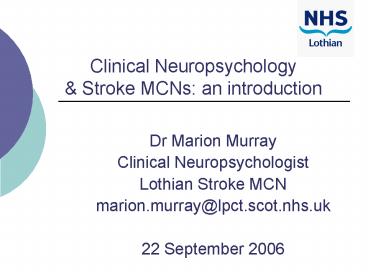Clinical Neuropsychology - PowerPoint PPT Presentation
1 / 11
Title: Clinical Neuropsychology
1
Clinical Neuropsychology Stroke MCNs an
introduction
- Dr Marion Murray
- Clinical Neuropsychologist
- Lothian Stroke MCN
- marion.murray_at_lpct.scot.nhs.uk
- 22 September 2006
2
Background to MCNs
- Scottish Executive HDL (2002) on development of
Managed Clinical Networks - Linked groups of health professionals and
organisations from primary and secondary and
tertiary care, working in a co-ordinated manner,
unconstrained by existing professional and Health
Board boundaries, to ensure equitable provision
of high quality clinically effective services
throughout Scotland - Set out 12 core principles
3
MCN Core Principles
- Clear management arrangements
- Defined structure
- Clear statement of the specific and service
improvements patients can expect - Documented evidence base (e.g., SIGN guidelines)
a commitment to ongoing research - Multidisciplinary focus with clarity on the roles
of professionals - Clear policy on the dissemination of information
to patients
4
MCN Core Principles cont.
- Agreement of all professionals involved to work
within an evidence base and to the principles of
the MCN - A quality assurance programme acceptable to NHS
Quality Improvement Scotland - Commitment to exploiting education potential to
the full, in partnership with others where
appropriate - A commitment to ongoing audit
- Appropriate continuing professional development
programmes for all staff - A commitment to pursuing value for money
- Ultimate aim to improve patient care with
standards set for patient journey.
5
Stroke
- Scotland has very high rates of stroke
- SIGN 64 Guidelines indicate 70 000 people living
with stroke and 15 000 new stroke events each
year in Scotland - In 2002 2003, Lothian had an estimated
population of 783 600 and the stroke rate was
3.76 per 1000 (about 2946 strokes. First
incidence lies at about 1300) - 3rd major cause of death main cause of serious
disability - 30 of stroke patients die within the first year
- ½ survivors left dependent
6
Prevalence of psychological problems post stroke
- At least 35 of survivors have permanent
intellectual impairment. - (50 75 have affected cognitive functioning
Haring, 2002) - Approx 16 will reach criteria for dementia
- 20 80 of people will reach criteria for
depression after stroke - Wide variation within the literature due to
timing of assessment and criteria used - Other mood disorders prevalent
- Anxiety (Astrom, 1996 Gillespie, 1997)
- Emotionalism
- PTSD? (Sembi et al., 1998)
7
Importance of Psychological Intervention
- Mood related to mortality rates (House et al.
2001) - Depression, fatigue and cognitive problems 1 year
post stroke were predictors of mobility decline
(van de Port et al., 2006) - Cognitive problems and depression lead to reduced
health related quality of life. - Carers find cognitive difficulties
personality change most difficult to deal with - Link between mental health of carers and person
who has had stroke - As acute care improves there is an increase in
longer term disability
8
SIGN guidelines key elements of a clinical
psychologist
- Direct work
- Detailed neuropsychological assessment
(assessment of cognitive emotional effects of
stroke) - Neuro-rehabilitation (both direct suggesting
strategies to others) - Skilled therapeutic intervention for mental
health problems - Use appropriate techniques to manage difficult
behaviour - Services to carers professionals
- Work within MDT to use results of assessments to
develop care programmes - Training, supervising, consultation
- Working with families on adjusting and
understanding cognitive deficits
9
SIGN guidelines key elements of a clinical
psychologist cont.
- Services to purchasers planners
- Designing service evaluation and audit projects
to identify psychological needs and provide
information about service use and outcome - Research
- Improving understanding of psychological problems
and efficacy of assessment and treatment methods.
10
Current Status
- Increased psychology staffing for stroke services
across Scotland. - But not all geographic areas have input.
- Challenges
- Trying to marry SIGN guidelines/BPS guidelines
with MCN principles - Working with staff unaccustomed to psychology
- Some staff isolated with no B Grade for support
11
Stroke Psychology Services
- Health Boards with specific Stroke MCN
psychological input - Argyll Clyde, Ayrshire Arran, Dumfries
Galloway, Fife, Grampian, Greater Glasgow,
Highland, Lothian - Health Boards without (to my knowledge) specific
Stroke MCN psychological input - Borders, Forth Valley, Lanarkshire, Tayside,
Orkney, Shetland, Western Isles





![⚡[PDF]✔ Practical Handbook of Clinical Gerontology PowerPoint PPT Presentation](https://s3.amazonaws.com/images.powershow.com/10046723.th0.jpg?_=202406030512)


![[PDF] Ethical Decision Making in Clinical Neuropsychology (AACN Workshop Series) 2nd Edition Ipad PowerPoint PPT Presentation](https://s3.amazonaws.com/images.powershow.com/10079352.th0.jpg?_=202407160712)






















